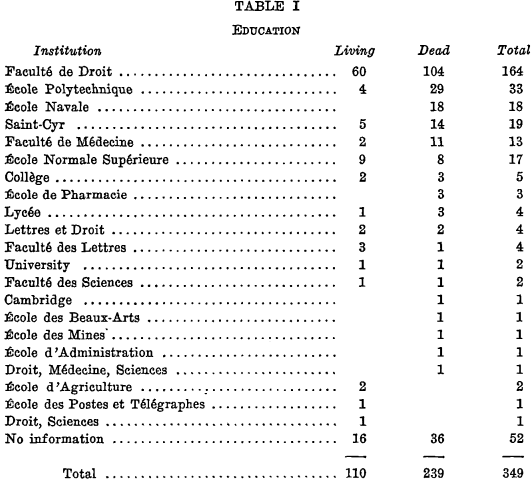Article contents
The Personnel of French Cabinets, 1871–19301
Published online by Cambridge University Press: 01 August 2014
Extract
From the election of the National Assembly in February, 1871, to the fall of the Briand cabinet in October, 1929, France had eighty-two cabinets and 349 cabinet ministers, under-secretaries excluded. Although French ministers  ordinarily neither wield the power of English ministers nor leave behind them a deep impression upon governmental policy, they nevertheless constitute, ensemble, the governing class of the nation. Every deputy and senator looks forward to the day when he can inscribe the words ancien ministre after his name. Of the 349 who have held a portefeuille, 110 are still living. They constitute a large field for selection whenever a new cabinet is formed, and it is seldom necessary—or even advisable—for an incoming premier to go far outside their ranks in making up a new list for the approval of the president of the Republic.
ordinarily neither wield the power of English ministers nor leave behind them a deep impression upon governmental policy, they nevertheless constitute, ensemble, the governing class of the nation. Every deputy and senator looks forward to the day when he can inscribe the words ancien ministre after his name. Of the 349 who have held a portefeuille, 110 are still living. They constitute a large field for selection whenever a new cabinet is formed, and it is seldom necessary—or even advisable—for an incoming premier to go far outside their ranks in making up a new list for the approval of the president of the Republic.
What type of Frenchman has risen to the ministry under the Third Republic? Whence does he come? What has been his education, his occupation, his previous political experience? If there has been a “type,” has it changed as the Third Republic has come to be more and more firmly established? Do the heads of certain ministries depart from the general type? Are there personalities that demand special attention and study? These are some of the questions that arise concerning the political personnel, not only of French, but of other modern national governments.
- Type
- Foreign Governments and Politics
- Information
- Copyright
- Copyright © American Political Science Association 1931
Footnotes
There is no French dictionary of national biography. The quest for biographical facts—pursued during a year of study abroad as a Social Science Research Council fellow—has run through various sources, such as biographies, biographical dictionaries of parliamentarians, encyclopaedias, the newspapers of Paris and the departments, and the archives of the Senate, the Chamber of Deputies, and the various ministries. Questionnaires were sent to practically all living ministers, and answers were returned by approximately half of them.
References
2 On August 1, 1930.
3 Of the 123 who had experience in neither administration nor local politics, 45—5 among the living, and 40 among the dead—were non-parliamentarians.
4 See Veran, Jules, Comment on devient Deputé, Senateur, Ministre (Paris, 1924)Google Scholar.
- 3
- Cited by



Comments
No Comments have been published for this article.